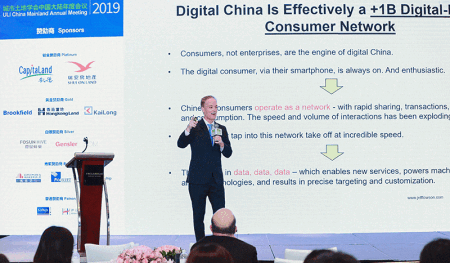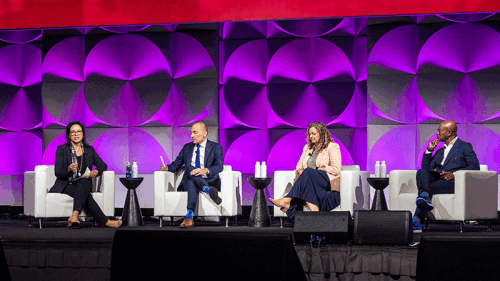This article is also available to Mandarin.
China is a nation more than a 1 billion “digital-first” consumers, Jeffrey Towson, managing partner at Towson Group and a Peking University professor, said at a recent ULI event in Shanghai. Because these consumers are starting to act like an interconnected network—influencing each other and generating fresh ways of doing transactions—they are shaping how almost all companies do business.
China is not only the largest single market for e-commerce globally, but also its citizens are the world’s biggest source of internet content. About 25 percent of all sales in China are now taking place online, up from barely 1 percent a decade ago, and the online spending of the nation is greater than that of the United States, Germany, and Japan combined.
The raw numbers do not tell the real story, though, Towson said. He believes that emergence of the digital-first network of citizens is leading Chinese society to develop in unheralded ways, with online consumer behavior shaping policy, city planning, transportation, and more.
“What we are seeing in China is the emergence of a digital lifestyle, something we don’t see anywhere else this advanced,” he said. “Suddenly this population is connected, and they’re online all the time.”
Increasingly, Chinese consumers notice no difference between the online and off-line worlds. People used to think that online retail was putting brick-and-mortar stores out of business; now grocery stores, for instance, in China are showing how companies can best combine both.
Grocery stores opened by the Alibaba Group effectively take the off-line warehouse that used to be on the outskirts of town and move it into the back third of the store. From this space, the store fulfills orders placed online as well as purchases made in real time in the store itself. The store provides the conventional retail component of the business, but also offers a host of services on the store property.
“They’re shifting all their consumers onto their app so they are connected all the time, and combining that with on-demand delivery so you don’t have to sell things physically in the store anymore,” Towson says. Motorbike couriers have become an outsourced part of the company’s sales force.
Alibaba has gone even further with its digitized hotels. Visitors make a reservation online then check in online when they arrive at the property. They pay on Alipay, then walk to the elevator, where a camera recognizes their faces from the image supplied and allows them to reach their floor. Another camera at the room door recognizes the visitor to allow access to the room, where a Tmall Genie smart speaker helps turn the lights to desired brightness, order dinner, and arrange a movie. A robot brings the meal to the door.
“There’s nobody there. It’s kind of weird being in a hotel with no people,” Towson says. “A lot of this is experimental. Sometimes digitization is an add-on, and sometimes it’s a game-changer.”
Companies that make the transition quickly to combine off-line and online offerings have benefitted early on. But even the most reticent industries are being dragged online.
Towson cites the example of luxury goods. Brands such as Prada, Gucci, and Louis Vuitton long resisted the call to take their products and sales online: their high-end goods did not look particularly impressive when digitized, and they wanted consumers to visit their eye-catching, pampering stores to experience far more than a simple purchase.
They have had to comply in the end because 32 percent of global spending on luxury goods comes from Chinese consumers, and those consumers want to shop in a way that combines online and off-line capabilities—using an app while standing in the store to model stock not in the store, checking a smart mirror to see how the product might look, ordering online for quick delivery, and talking to the sales staff over a glass of champagne.
“Digital Chinese consumers are driving companies to create products and services that are superior for a digital world,” Towson said.
Though China is breaking new ground, it is not the only place in the world where digital innovation is driving the economy. Other parts of Asia are fast on China’s heels, aided in that transition by the fact Alibaba now controls the majority of Southeast Asia’s largest online retailer, Lazada.
The retail markets in Mexico and Brazil are also beginning to demonstrate many of the same characteristics. Companies and consumers in those nations “think that this is their future,” Towson said. “They’re not looking at Amazon.com; they’re looking at Alibaba, and they should. It makes sense.”
It is likely that smart cities will be developed in an open online infrastructure much as smartphone makers develop an operating system for their phone, then allow app designers to create a wild array of digital tools to help users operate that hardware. This process brings in more bright minds in the form of developers and more backing in the form of venture capital and private equity.
What is happening in China is not necessarily always for the best, Towson noted. Much of the innovation may lead nowhere. For instance, staff-free hotels may not appeal to all consumers. But the trends developing in China now will surely influence the rest of the world, and soon, he said.
“It’s exciting and it’s unnerving,” he said. “But in China, you’re going to be the center of the action.”


